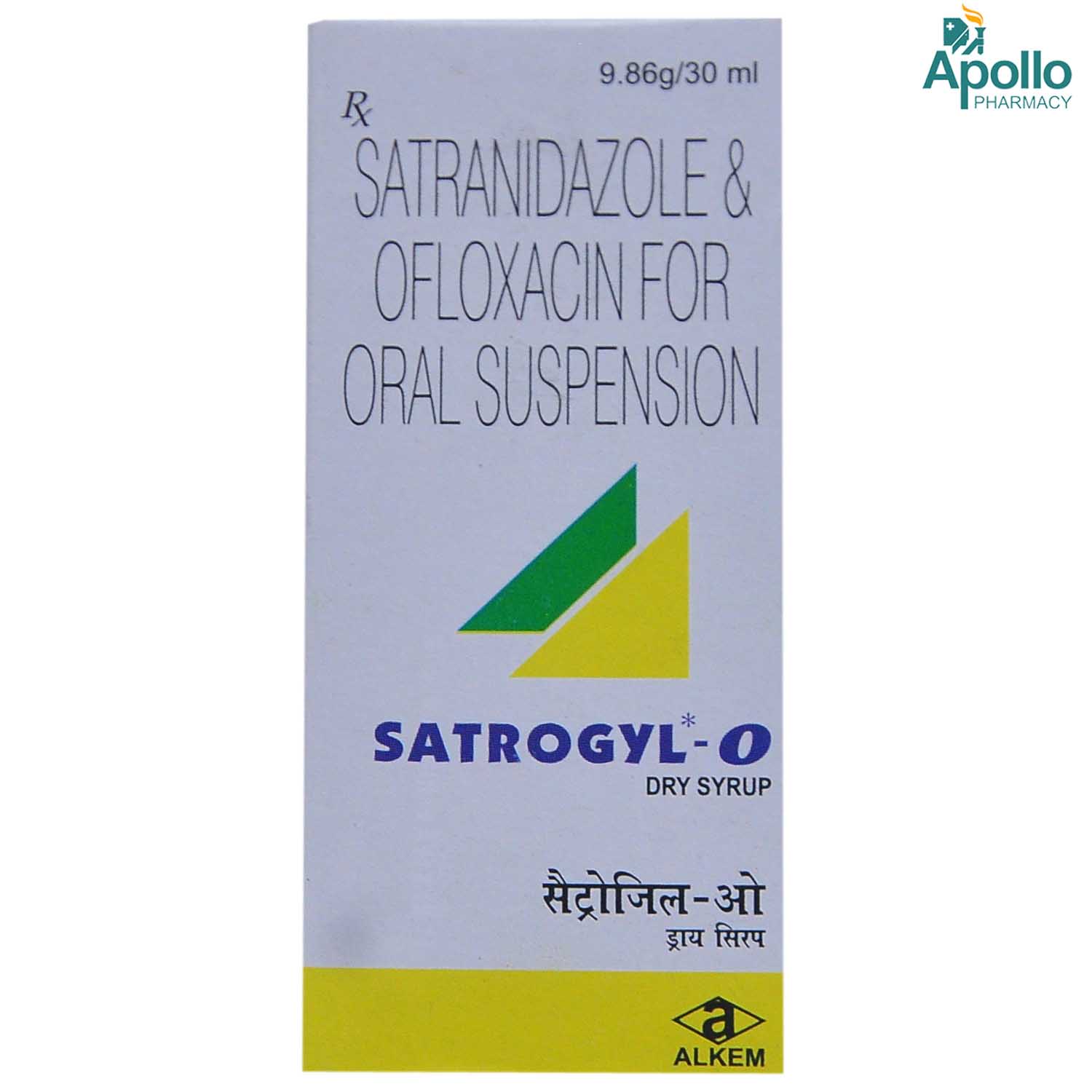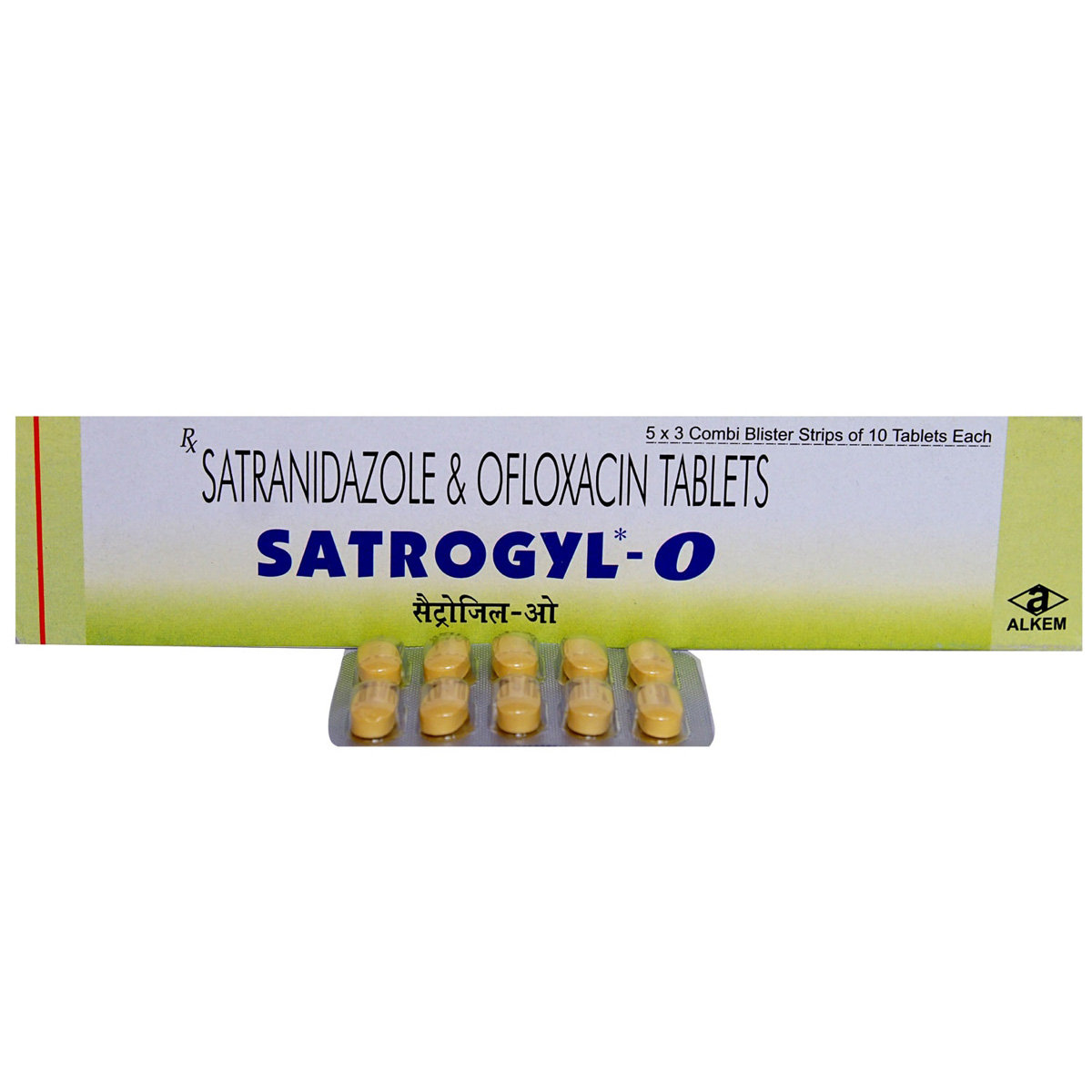Ofloxacin+satranidazole
About Ofloxacin+satranidazole
Ofloxacin+satranidazole belongs to the class of ‘antibiotics’, primarily used to treat diarrhoea and dysentery. It helps treat bacterial infections, including intra-abdominal infection, gynaecological and pelvic infections, foot ulcers in diabetes, post-operative infections, dental infections, and infections in immunocompromised patients. Diarrhoea is a condition that causes the frequent passing of loose or watery stools. Dysentery is an intestinal inflammation that leads to severe diarrhoea accompanied by mucus or blood in the stools. Bacterial infections are caused by the multiplication of harmful bacteria inside or on the body.
Ofloxacin+satranidazole contains two antibiotic medicines, namely: Ofloxacin and Satranidazole. Ofloxacin belongs to a class of antibiotics known as quinolones. It works by inhibiting bacterial DNA gyrase, an enzyme required for replicating, transcribing, and repairing DNA. Satranidazole is an anti-amoebic, antiprotozoal, and antibacterial medicine that treats various infections caused by bacteria and parasites (amoebas). It is bactericidal, killing harmful bacteria and parasites (such as amoebas) by damaging their DNA. It prevents the division of bacterial cells and inhibits the repair of bacterial cells.
Please take Ofloxacin+satranidazole in the dose and duration prescribed by your doctor based on your medical condition. Ofloxacin+satranidazole is generally safe to use. However, some individuals may experience side effects such as nausea, vomiting, stomach pain, loss of appetite, dizziness, and headaches. Most of these side effects of Ofloxacin+satranidazole do not require medical attention and typically resolve on their own over time. If these side effects persist longer, please consult your doctor.
If you are allergic to Ofloxacin+satranidazole or any other medicines, please tell your doctor. Do not suddenly stop this medicine to avoid unpleasant side effects and sudden withdrawal symptoms. Intake of probiotics, prebiotics, and plenty of fluids is recommended if you suffer from dysentery and diarrhoea. Do not drive or operate heavy machinery after taking Ofloxacin+satranidazole as it may cause dizziness. Please try avoiding alcoholic beverages during your treatment, as they can cause flushing and a general sick feeling. Pregnant and breastfeeding women should use Ofloxacin+satranidazole with proper consultation and caution.
Uses of Ofloxacin+satranidazole
• Treats bacterial diarrhoea: Ofloxacin+satranidazole helps eliminate harmful bacteria in the intestines that cause loose and watery stools.
• Manages amoebic dysentery: Ofloxacin+satranidazole is effective against protozoal infections that cause bloody stools, abdominal cramps, and persistent diarrhoea.
• Controls mixed infections: Ofloxacin+satranidazole treats gastrointestinal infections involving both bacteria and protozoa, providing broad-spectrum antimicrobial action.
Medicinal Benefits
Ofloxacin+satranidazole contains two antibiotic medicines, namely: Ofloxacin and Satranidazole. Ofloxacin is a quinolone antibiotic that inhibits bacterial DNA gyrase, an enzyme required for replicating, transcription, and repairing the DNA. Satranidazole is an anti-amoebic, antiprotozoal, and antibacterial medicine effective against a wide range of gram-positive and gram-negative bacteria. It kills the harmful anaerobic bacteria and certain anaerobic protozoa (Trichomonas vaginalis, Entamoeba histolytica, and Giardia lamblia), causing diarrhoea. It is bactericidal, killing harmful bacteria and parasites (such as amoebas) by damaging their DNA. It also prevents the division of bacterial cells and inhibits the repair of bacterial cells.
Directions for Use
- Ofloxacin+satranidazole can be taken with or without food, or as advised by a doctor.
- Follow your doctor's instructions on the dosage and timing of this medication to ensure safety.
- Swallow Ofloxacin+satranidazole as a whole with a glass of water.
- Do not crush, break, or chew it.
Storage
Side Effects of Ofloxacin+satranidazole
- Nausea
- Vomiting
- Stomach pain
- Loss of appetite
- Dizziness
- Headache
Drug Warnings
Brief your medical history to the doctor if you are allergic to Ofloxacin+satranidazole or any of its components. Please let your doctor know in advance if you have liver or kidney diseases, tendonitis, fits, blood dyscrasia, colitis, diabetes, myasthenia gravis (muscle weakness), dehydration, high blood pressure, nerve problems (peripheral neuropathy), mental/mood disorders (depression) or are undergoing dialysis treatment. Please consult your doctor if you are planning to become pregnant or are already pregnant before starting Ofloxacin+satranidazole. Do not drive or operate heavy machinery after taking Ofloxacin+satranidazole as it may cause dizziness and visual disturbances. Please try avoiding alcoholic beverages during your treatment, as they can cause flushing and a general sick feeling. Ofloxacin+satranidazole is not recommended for children less than 18 years of age.
Drug Interactions
Drug-Drug Interaction: Ofloxacin+satranidazole may interact with blood thinners (such as acenocoumarol and warfarin), painkillers (such as aspirin), herbal products (such as ginkgo), respiratory drugs (such as albuterol), and medications used to treat alcohol addiction (such as disulfiram).
Drug-Food Interaction: The consumption of alcoholic beverages should be avoided as it may lead to flushing, drowsiness, and dizziness.
Drug-Disease Interaction: Inform your doctor before starting Ofloxacin+satranidazole if you have liver or kidney diseases, tendonitis, fits, blood dyscrasia, colitis, diabetes, myasthenia gravis, dehydration, dialysis, high blood pressure, nerve problems, and mental/mood disorders (depression).
Drug-Drug Interactions Checker List:
Safety Advice

Alcohol
cautionAlcohol consumption may worsen the side effects of Ofloxacin+satranidazole, like dizziness and visual disturbances. It is better to avoid alcohol while you are being treated with Ofloxacin+satranidazole.

Pregnancy
cautionThere is limited data on how the Ofloxacin+satranidazole affects pregnancy. Please consult your doctor if you are planning to become pregnant or are already pregnant before starting Ofloxacin+satranidazole.

Breast Feeding
cautionOfloxacin+satranidazole is excreted into the breast milk and may affect the nursing infants. Please consult your doctor before taking Ofloxacin+satranidazole if you are breastfeeding.

Driving
cautionDo not drive or operate machinery if you experience any impairment of skills, dizziness and visual disturbances while using Ofloxacin+satranidazole.

Liver
cautionPlease take Ofloxacin+satranidazole with caution and doctor’s advice if you have a history of liver diseases/conditions.

Kidney
cautionPlease take Ofloxacin+satranidazole with caution and doctor’s advice if you have a history of kidney diseases/conditions.

Children
unsafeOfloxacin+satranidazole is not recommended for children less than 18 years of age.
Habit Forming
Diet & Lifestyle Advise
- Antibiotics can alter the beneficial bacteria in the stomach. Therefore, you are advised to consume foods rich in probiotics, such as yoghurt, curd, kefir, sauerkraut, tempeh, kimchi, miso, kombucha, buttermilk, natto, and cheese.
- Eat fibre-rich food like whole grains, beans, lentils, berries, broccoli, peas, and bananas.
- Avoid foods rich in calcium, such as grapefruit and grapefruit juice, as they may hinder the absorption of antibiotics.
- If you have diarrhoea, try to drink appropriate amounts of fluids to avoid dehydration.
- If you have minor diarrhoea (less than four stools daily), drinking caffeine-free soft drinks, juices, or sport rehydration drinks can be sufficient.
- If the diarrhoea is more severe, specially formulated rehydration drinks should be taken.
- Avoid alcoholic beverages with Ofloxacin+satranidazole as it can make you dehydrated and may affect your sleep. This can make it harder for your body to aid the Ofloxacin+satranidazole in fighting off infections.
Special Advise
- Ofloxacin+satranidazole contains Ofloxacin, which might produce false-positive urine screening results for opiates. Inform the laboratory staff that you are taking Ofloxacin+satranidazole.
- Monitor your blood sugar levels regularly, as Ofloxacin may affect glucose levels in individuals with diabetes.
- Ofloxacin+satranidazole may affect coagulation test or prothrombin time (time is taken for blood clotting), liver function tests, and serum tests. Therefore, it is advisable to inform your doctor and laboratory staff in advance if you are undergoing these examinations.
- Quinolone antibiotics, such as Ofloxacin, may cause QT prolongation (the heart muscle takes longer than usual to recharge between beats) in some patients, as indicated by an electrocardiogram (ECG).
Patients Concern
Disease/Condition Glossary
Diarrhoea is a condition that causes the frequent passing of loose or watery stools. It is caused by bacteria (such as Campylobacter and Escherichia coli), viruses (including norovirus and rotavirus), and parasites in contaminated food and water.
Dysentery is an intestinal inflammation that leads to severe diarrhoea accompanied by mucus or blood in the stools. It is mainly caused by Shigella bacteria (shigellosis) or an amoeba.
Bacterial infection occurs when harmful bacteria grow in the body and cause an infection. It can infect any part of the body and multiply very quickly. Bacteria occur in three basic shapes: spherical, rod-shaped and spiral-shaped. Bacteria may be gram-positive (have a thick cell wall) or gram-negative (do not have a cell wall). Some common symptoms of a bacterial infection include cough, fever, and tiredness.
FAQs
Ofloxacin+satranidazole is used to treat diarrhoea and dysentery. It helps treat bacterial infections, including intra-abdominal infection, gynaecological and pelvic infections, foot ulcers in diabetes, post-operative infections, dental infections, and infections in immunocompromised patients.
Ofloxacin+satranidazole contains Ofloxacin and Satranidazole. These drugs are antibiotics that kill and prevent the bacterial growth that causes diarrhoea, dysentery, and other bacterial infections.
Please let your doctor know if you have a history of allergic reactions to medicines, liver or kidney diseases, high blood pressure, nerve problems (peripheral neuropathy), mental/mood disorders (depression), tendonitis (inflammation of the tendon, a tissue connecting muscle and bone), fits, blood dyscrasia (decreased peripheral blood cell counts), colitis (inflammation of the colon), diabetes, myasthenia gravis (muscle weakness), dehydration and undergoing dialysis treatment.
Ofloxacin+satranidazole consists of Ofloxacin, a quinolone antibiotic that may cause hypoglycaemia (low blood sugar levels) or hyperglycaemia (high blood sugar levels). It is advised to consult your doctor before using Ofloxacin+satranidazole and monitor your blood sugar levels regularly.
Do not stop using Ofloxacin+satranidazole even if you feel better until the doctor's advised course is finished. Your symptoms may improve, but the infection may not be cured completely.
For most healthy individuals, taking ibuprofen with Ofloxacin+satranidazole is generally safe. However, those with a history of seizures, epilepsy, other nervous system disorders, or kidney problems, as well as those taking medicines that affect the brain, should use this combination with caution and under medical supervision.
Ofloxacin+satranidazole contains a quinolone antibiotic, Ofloxacin, which can affect live vaccines, such as the typhoid vaccine, and decrease its effectiveness. Please consult a doctor before you start Ofloxacin+satranidazole if you are undergoing any vaccinations.
It is recommended to maintain a minimum gap of two hours between magnesium/aluminium antacids, sucralfate, zinc or iron preparations and Ofloxacin+satranidazole.
Ofloxacin+satranidazole may cause side effects like nausea, vomiting, stomach pain, loss of appetite, dizziness, and headache. Most of these side effects of Ofloxacin+satranidazole do not require medical attention and typically resolve on their own over time. If these side effects persist longer, please consult your doctor.
Do not exceed the recommended dose as it may cause unpleasant side effects. Consult the doctor if you have taken an overdose of Ofloxacin+satranidazole.
Consult the doctor if you have no improvement even after taking Ofloxacin+satranidazole for the prescribed duration. The doctor might adjust the dose or prescribe alternative medicine based on your condition.
Consult your doctor before taking other medications with Ofloxacin+satranidazole to prevent any potential interactions. Please inform the doctor if you are taking blood thinners, pain medications, or herbal supplements.
Before starting Ofloxacin+satranidazole, inform the doctor if you are allergic to any of the components in Ofloxacin+satranidazole, have epilepsy, tendonitis (tendon inflammation), glucose-6-dehydrogenase deficiency, are pregnant or breastfeeding, have a history of mental illness, or have liver/kidney/heart problems.
If you miss a dose of Ofloxacin+satranidazole, take it as soon as you remember. However, if it is almost time for the scheduled dose, skip the missed dose and take the next dose at the scheduled time.
Alcohol consumption may worsen the side effects of Ofloxacin+satranidazole, like dizziness and visual disturbances. It is better to avoid alcohol while you are being treated with Ofloxacin+satranidazole.
Ofloxacin+satranidazole is not recommended during pregnancy. Consult the doctor if you are pregnant, think you are pregnant or are planning to become pregnant.
Ofloxacin+satranidazole may cause dizziness, sleepiness and visual disturbances. Therefore, avoid driving or operating machinery unless you are alert.
Store Ofloxacin+satranidazole at room temperature in a dry place. Keep it out of sight and reach of children.





